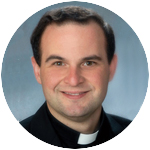
Father Eric J. Banecker
Here in the Archdiocese of Philadelphia, the Sunday obligation returns, appropriately enough, on Aug. 15, the Solemnity of the Assumption of the Blessed Virgin Mary. On the one hand, it marks a moment of joy that the COVID-19 pandemic (delta variant notwithstanding) is losing its grip on life, ever so slowly. At the same time, though, I have spoken to brother priests who face this moment with some trepidation.
There is a palpable feeling that the return of the obligation to attend Sunday Mass will not change that much. There are some who suggest that those who are coming back are already back, even though many churches are only experiencing half of their pre-pandemic crowds.
It is helpful to remember how we got here. In previous generations, Sunday had a uniqueness about it. Most businesses were closed. Families got together for brunch or dinner. The buying, selling and producing of the rest of the week ceded ground to cultus: worship of God and growth in the virtues and arts which make life worth living.
[hotblock]
Now, of course, things are different. Chick-fil-a stands out as one of the few major companies to take Sunday off. Thanks to the internet, I can purchase anything I want on Sunday – which requires UPS drivers and workers at distribution centers to fulfill our buying impulses. In short, Sunday doesn’t feel different for many people any more, except as the day before they have to go back to work.
There is an interesting chicken-and-egg question here: did a widespread loss of Sunday lead to a decline in participation in worship services? Or is it the other way around?
While the answer is probably “both/and,” I think there is a strong case to be made that the triumph of productive and economic activities is a direct result of the crisis of faith in our society. After all, a robust and healthy community with worship of God and cultivation of ties of family and friendship at the center doesn’t need “blue laws,” because the habits behind such ordinances have already been internalized (here I think of the motto of the University of Pennsylvania: leges sine moribus vanae – laws without morals are useless).
Indeed, the past half-century has witnessed a demonstrable decline in those most important relationships, those things that make life meaningful. Mass attendance has dropped at an alarming rate. Divorce has increased and marriage rates have plummeted. Disturbing numbers of people report feeling lonely, isolated and without any true friends.
I am convinced that the renewal of society begins — at least for Christians — with a renewal of Sunday. And the resurrection of Sunday requires a new religious fervor among Catholics, a desire to glorify God and to grow in holiness in communion with the assembly of believers gathered for Sunday Mass. But that requires one more thing: a renewed confidence in the ministerial priesthood among the members of the church.
[tower]
Now, of course, no one is Catholic because of this or that priest, only Christ the great high priest. Neither should we leave the church because of the actions of this or that priest. Being Catholic means above all else to share in the life of the Trinity through a relationship with Jesus Christ conferred in baptism and strengthened by the sacraments, teaching and life of the church. We should never make our faith dependent on any human being, but on the love of God which has been poured into our hearts (Romans 5:5).
At the same time, however, despite the welcome emphasis on the Universal Call to Holiness in recent decades, we cannot just pretend that the holiness of priests is irrelevant. Without a doubt, the sacraments take place validly when celebrated by flawed priests, even deeply flawed priests.
And yet, that universal call to holiness is facilitated precisely by the ministry of priests. A priest striving for holiness will, unquestionably, be a better leader and servant of his people. The People of God deserve well-formed, integrated men who know the faith and seek to live it out in their own lives.
Are priests perfect? Of course not, and it would be unfair to expect otherwise. The Lord, as Pope Benedict XVI said upon his election as pope, “knows how to work even with imperfect instruments.” That was a consolation to him, and should be to us. But when a man drifts far afield in his teaching or actions, it is the duty of brother priests and superiors to offer correction and get him back on track, for his own soul and for the sake of the people in his charge.
There have been, once again, unpleasant headlines about priests in recent weeks. Instead of blaming the messengers, particularly those who actually desire the good of the church, we should use this as an impetus to pursing excellence in our vocation, whether as clergy, religious or laity. Such reports should remind us of the need to help one another in bearing burdens and in living the Gospel in its fulness.
That, after all, is what our contemporaries need. That is what will draw them back to our church buildings on Sunday morning.
***
Father Eric J. Banecker is pastor of St. Francis de Sales Parish, Philadelphia.
PREVIOUS: No time for fairy tales: Believe the science, get the vaccine
NEXT: St. Augustine on sustainability: ‘Enough for all, always’



Share this story